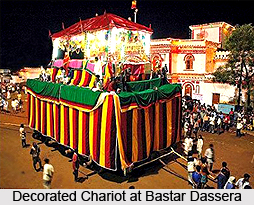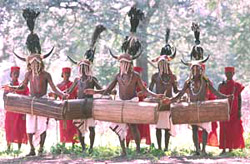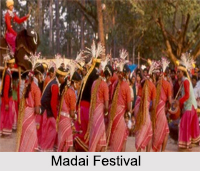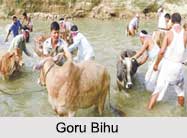 Rongali Bihu is celebrated widely in Assam. It is one of the prominent cultural festivals in the month of Baishakh. The Rongali Bihu symbols the agricultural New Year at the arrival of seeding time and is famous as the Festival of happiness. Rongali Bihu is also known as "Bohag Bihu". Rongali bihu is the celebration for which every Assamese waits excitedly for the whole year to enjoy to the fullest. Rongali Bihu or Bohag Bihu is the new year of Assamese calendar and is celebrated all over the month.
Rongali Bihu is celebrated widely in Assam. It is one of the prominent cultural festivals in the month of Baishakh. The Rongali Bihu symbols the agricultural New Year at the arrival of seeding time and is famous as the Festival of happiness. Rongali Bihu is also known as "Bohag Bihu". Rongali bihu is the celebration for which every Assamese waits excitedly for the whole year to enjoy to the fullest. Rongali Bihu or Bohag Bihu is the new year of Assamese calendar and is celebrated all over the month.
History of Rongali Bihu
Traditionally, it is believed that the carnival of Bihu originated in the pre-Aryan days roughly the 3500 century BC. From then onwards to the next many centuries until the new, celebrations used to last for a month or more, which currently have been reduced to a week. Even the word "Bihu" is said to have been derived from the language of Dimasa Kacharis, an agrarian family that has existed from centuries. Since long, Bihu has been a festival to express joy, offer thanks, and pray for a plentiful crop. The folk songs known as Bihu geets or Bihu songs have been associated with the first and mainly popular of Bihus, Rongali Bihu, for long.
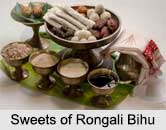 Though, the languages of these songs have changed from generation to generation, they have for all time been an essential part of Rongali Bihu celebrations. These songs are composed in couplets that poem and each verse depict a special emotion in total. Farmers, from long, believed that the erotic nature of these songs would sexually awaken the earth`s body, leading to a plentiful crop. For this very cause and for celebrations of course, many of such songs are still sung by the tribal farmers. The Bihu songs also had persuade Assamese literature, and fairy tale has it that Madhav Deva, whose exceptional contributions comprise Assamese representation of the Adi Kanda of Valmiki`s Ramayana; and Sankar Deva, the immense song musician could not break out from the influence of Bihu geets.
Though, the languages of these songs have changed from generation to generation, they have for all time been an essential part of Rongali Bihu celebrations. These songs are composed in couplets that poem and each verse depict a special emotion in total. Farmers, from long, believed that the erotic nature of these songs would sexually awaken the earth`s body, leading to a plentiful crop. For this very cause and for celebrations of course, many of such songs are still sung by the tribal farmers. The Bihu songs also had persuade Assamese literature, and fairy tale has it that Madhav Deva, whose exceptional contributions comprise Assamese representation of the Adi Kanda of Valmiki`s Ramayana; and Sankar Deva, the immense song musician could not break out from the influence of Bihu geets.
Celebration of Rongali Bihu
Famous as Bohag Bihu too, this festival is celebrated over a period of some days in the month of April, usually around the 15th, also the first month according to the Assamese calendar. The first day is devoted to the farm animals and domestic animals. Cows and bulls are given a custom bath in the close by ponds or river banks with a glue of freshly harvested turmeric and black gram. Also the older cattle ropes are thrown away through the legs and fresh ropes are tied to them. On this day, they are freed and are allowed to roam wherever for the whole day. It`s like a blessing ritual to the cattle for providing people with dairy products. A traditional song is also sung while giving them a bath which asks them to be well and fruitful. From the next day, merriment begins that go for a several days.
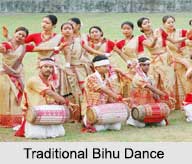 Throughout these days, Assam can be seen overwhelmed in the celebrations with hundreds of young men and women presenting Bihu dances on Bihu folk music sung to the melody of drums, gagana, toka, pepas (flute made of buffalo horns). But before it starts, people get cleaned up, wear new clothes, and introduce them with new found liveliness to go in the New Year. On this day, people also give respect to their elders by presenting them with Gamosas, which are customary Assamese hand woven cotton towels with red designs. Also, community feasts are organized, sweets and greetings are exchanged with neighbors, relatives, and friends; and traditional dishes like Pitha Larus and Jolpan are prepared. For each day of the celebrations, different events are organized. The multicolored zeitgeist, with which the whole festival is celebrated and concluded, makes it one of the most appealing festivals to be a part of.
Throughout these days, Assam can be seen overwhelmed in the celebrations with hundreds of young men and women presenting Bihu dances on Bihu folk music sung to the melody of drums, gagana, toka, pepas (flute made of buffalo horns). But before it starts, people get cleaned up, wear new clothes, and introduce them with new found liveliness to go in the New Year. On this day, people also give respect to their elders by presenting them with Gamosas, which are customary Assamese hand woven cotton towels with red designs. Also, community feasts are organized, sweets and greetings are exchanged with neighbors, relatives, and friends; and traditional dishes like Pitha Larus and Jolpan are prepared. For each day of the celebrations, different events are organized. The multicolored zeitgeist, with which the whole festival is celebrated and concluded, makes it one of the most appealing festivals to be a part of.
Traditions and Customs of Rongali Bihu
To commemorate the joyous Rongali Bihu festival, people of Assam wear new and colorful clothes. People visit their neighbors, friends and relatives and give out sweet as they welcome each other a Happy Bihu. Lots of people also arrange grand feasts in the house to celebrate the event. Conventional festive food of Bohag Bihu is the unique cake known as the pitha. Rongali bihu falls in a phase when there is no work for the cultivators but still there is sufficient in the store to enjoy.


